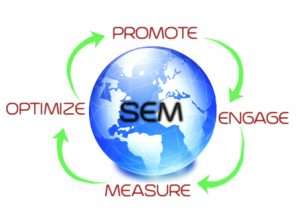What is Search Engine Marketing, and Do I Need it?
 As a business owner, you undoubtedly understand the importance of great marketing. In a time where everything has “gone digital,” tech-savvy marketing is crucial; even the smallest business owner is expected to have a website these days. With that comes a seemingly endless to-do list that can confuse even the most seasoned business owner. You can easily become overwhelmed by all the search engine marketing jargon out there. SEO, SMM, SEM, CPC, PPC — what does it all mean? Do I need it, and if so… how do I do it?
As a business owner, you undoubtedly understand the importance of great marketing. In a time where everything has “gone digital,” tech-savvy marketing is crucial; even the smallest business owner is expected to have a website these days. With that comes a seemingly endless to-do list that can confuse even the most seasoned business owner. You can easily become overwhelmed by all the search engine marketing jargon out there. SEO, SMM, SEM, CPC, PPC — what does it all mean? Do I need it, and if so… how do I do it?
Delving into the what and hows of every form of digital marketing takes time, dedication, and experience. For our purposes here, let’s take a look at one of the most critical forms of digital marketing. One that guarantees effective, fast results — search engine marketing aka, SEM.
What is SEM?
The definition of SEM seems to be evolving. Some define SEM as an all-encompassing digital marketing strategy comprised of SEO (search engine optimization), competitive analysis, and paid search listings. More commonly today however, SEM is becoming a term solely for what we call, “paid search.”
Paid search, or SEM (get ready for more acronyms) includes:
Pay-per-click (PPC) advertising — allows you to buy visits to your site using advertisements that appear on the top of the search results. When someone clicks the ad, you pay a fee.
This is often used interchangeably with the term, cost-per-click (CPC), however PPC is actually meant to describe the type of advertising program you are using, while CPC communicates what you are actually paying per click within that advertising program. Another option is cost-per-thousand impressions (CPM).
The most common venues for PPC are:
Google: Adwords
Bing Ads
Yahoo: Search Ads
Good to know, but why do I need SEM?
Glad you asked! SEM is great for many reasons. Here are a few:
- Instant visibility. Paid ads create top, first page links to your site instantly while you wait for organic (best practice) SEO, which can take some time. Just be sure the ads are well written so people will click them.
- Targets your audience. SEM is based on keywords your audience is searching for. For example, if you’re a website designer, then web searchers looking for web design could be directed to your site. This also provides insight into what people are searching for, so you can modify your website content accordingly.
- Provides measurable data. With SEM, you know exactly what you are getting for the amount of money you spend. Visits to your website are tracked, so you know where your ads are most effective. This greatly helps you to make informed decisions for your marketing strategy and budget.
Sounds Great! How is it done?
SEM can be time consuming, and often requires the help of professionals for optimal results. If you’re interested in SEM, leave it to the pros at Watt Media. We can help you with all of your digital marketing needs, so you can focus on what’s most important — your quality products and services.